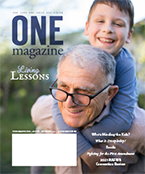
August-
September 2021
Living Lessons
------------------
|





A new discipleship resource available from Randall House...
There's a Story in All of Us (Will You Tell Yours?)
Imagine finding the journal of a famous person. How would you feel thumbing through the journals of George Washington, Thomas Aquinas, or Sacagawea? I had the privilege to see and read a few pages from the original journals of Winston Churchill, William Carey, and some original pages from A. A. Milne’s Winnie the Pooh. While I cherish those memories, I would trade all those for a few pages written by my grandfather or parents. I interviewed my grandfather several years before he died, but now I have more important questions to ask, yet will never know the answers. I wish I had asked, and I wish he had journaled.
Journaling provides parents (and grandparents) with a method to capture the attention of their kids. As adult children inherit or receive a journal written by their parents, they will pore over the pages. Famed baseball player Daryl Strawberry found his mother’s journal under her mattress after her death. He read prayers she had written—not about his baseball career—but that he would find Christ. Daryl did find Christ. While his mom did not see this occur in her lifetime, her journal was a catalyst to his change. Regardless of your relationship now, a journal can bridge hearts and mend wounds.
Most children have a built-in desire to know more about their parents. Use that emotional attraction to tell a story that also speaks into their lives. Claim the old adage, “There’s a story in all of us.” While we may not be Churchill, Parks, or Carey, one audience desperately needs to read your story: your kids and grandkids. Regardless of their age or how much they feign disinterest, they are eager to hear more details. The older they get, the more they care.
So, how do you go about telling your story? Suppose you sit down behind the computer screen. In that case, writer’s block becomes your best friend or his cousin, verbosity, the enemy of readability. And buying a thick, blank journal intimidates the writer as much as the blinking computer cursor.
What should you do? Consider buying a journal with question prompts to help tell your story. Great journals arrange questions intentionally and creatively to help you frame what you should say and prompt critical details to make it enjoyable to read. Your kids want to read the trivial and the serious, as the curiosity of the frivolous takes them to the powerful words of wisdom you get to impart.
Recently, Randall House and D6 Family ministries released a unique journal that tells your story alongside the story of your child (or grandchild). The left side pages provide questions to help your story come to life, and on the right, to share similar insights from your memories about your child.
Through the skinned knees, broken glasses, and broken hearts, your written words will mend more wounds than you can imagine. Many kids come to find Christ or discover a more serious relationship with Him after Mom and Dad are gone. Journals often contribute to their transformation. Historians all regret that Martha Washington burned all the letters she and George exchanged throughout their lives. How much history did we lose in that one act? How much will your kids lose if you don’t write? Leave them an heirloom that speaks beyond your earthly life in a way they will listen.
About You, About Me: Generational Legacy Journal provides five sections from curiosities to milestones, drawing readers in as they learn from your memories, insights, and encouragement. Along the way, they intentionally bump into Scripture and your faith values in non-threatening ways. Your kids and grandkids will revisit these pages often, creating a legacy of faith.
|
|

